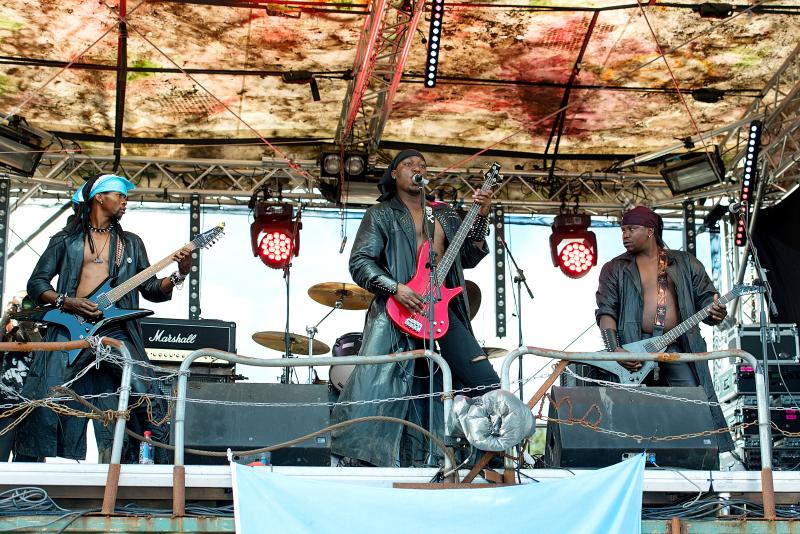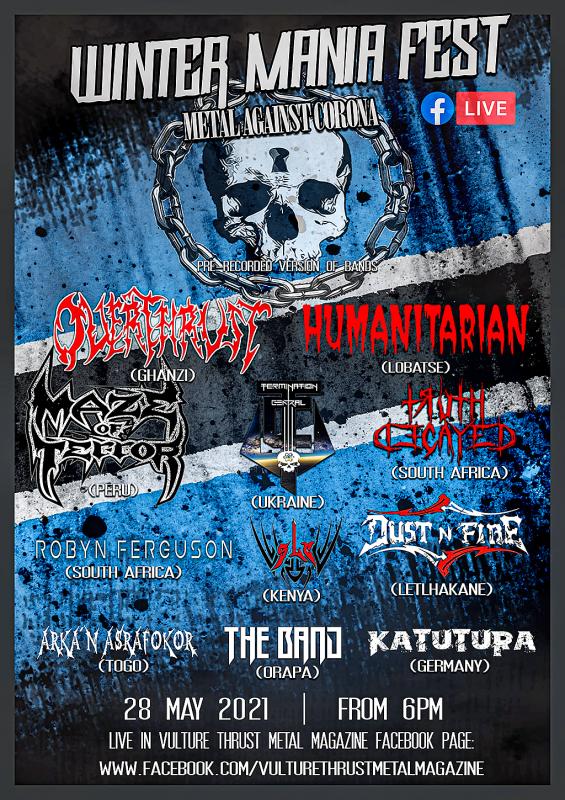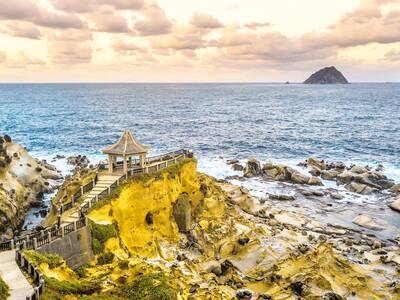Tshomarelo “Vulture” Mosaka used to think connecting with his leather-clad fans could only ever happen as he growled lyrics at one of Botswana’s underground heavy metal concerts — until the pandemic forced him to rock out online instead.
As well as keeping Mosaka’s band Overthrust in touch with fans during lockdown, going digital helped them find new audiences abroad and unexpected financial support as donations started pouring in — from cash to guitar strings.
“Someone even sent a fan because they could see we were sweating ... others sent me money when I was in a car accident to help cover the costs,” said Mosaka, 36, adjusting his leather cowboy hat at a cafe in Gaborone, the capital.

Photo courtesy of Wikimedia Commons
“We’ve been underground for very long, but now we want people to know about us,” said Mosaka, whose Facebook Live streams of local bands including his own have drawn thousands of viewers as far as Malaysia, Germany and the US.
The small, southern African country is typically known for its diamonds and game parks, less so for its heavy metal scene, and limited income from gigs means most Batswana musicians have to maintain a day job.
Mosaka, who has two children, also works as a security guard and a heavy metal concert organizer.

Photo courtesy of Overthrust
Despite low rates of Internet access and high data costs across the continent, many African musicians, comedians and artists have boosted their online presence during COVID-19 to forge links with fans and potential backers overseas.
“We’re trying to build the scene in Africa, from Angola to Namibia and South Africa,” said Mosaka.
“If we’re united here we can be exposed outside,” he said, adding that he was hopeful the bands would soon be invited to more international metal festivals.
HUMANITY AND LOVE
Heavy metal became popular in the late 1960s, mainly in the US and Britain, gaining traction a decade later with Batswana rockers — or Marok as they are known.
Some Marok say tourists bought in some of the first heavy metal records and CDs.
Now — Marok are quite well known in the country of 2.5 million people, largely for their leather attire in the blistering Botswana heat, their decorative chains, animal bones and studs used to mark their heavy metal admiration.
While rumors were once rife that the metal fans were vampires or criminals, they say such negative stereotypes are slowly dissolving as more women join their ranks and their charity work becomes better known.
One group — known as the Humanitarians — sing and post online about human rights issues such as homelessness and albinism.
“There was this message going around that rockers are the devil, but actually we spread the message of humanity and love,” said Martin Beats, one of the band members from their small recording studio in Lobatse village outside the capital.
Mosaka and his band have helped organize an annual heavy metal concert in Ghanzi, a town in the west of Botswana, called the Overthrust Winter Metal Mania Charity Fest since 2010, with 40 percent of profits donated to local charities.
It is also a space where women feel they can defy traditional gender roles and speak out against high rates of gender violence against women.
“I stand up as a woman, no man can try me,” said a veteran rocker who goes by the pseudonym Siera Madrid, 49, outside her home in Gaborone, donning a metal chain around her neck, leather boots and a black head scarf.
“We are called Queens and we are treated as such,” said the former law enforcement official, adding that many metal musicians and fans are police officers, soldiers and even priests.
LACKING INTERNET
Despite the positives of rocking out online during the pandemic, Marok members lament the fact that more than half of Botswana’s people do not have Internet access and that many foreigners have no idea where the country is.
“There is a talent for metal here but many people don’t even know where Botswana is,” said 38-year-old Nikki Mokalake, a metal fan from a village an hour outside Gaborone.
Many of the instruments they use are unavailable in Botswana, said Mosaka, adding that it can take band members three to four years to save up enough money to import them.
Last year’s lockdown was a particularly hard time, Beats said.
“It was tough ... but the online videos lifted our spirits,” he said, adding that one of his band’s videos reached nearly half a million people and their Facebook followers grew from 700 to nearly 6,000.
Mosaka stopped by at a metal workshop in Gaborone where a fellow rocker who goes by the name King Taker works, welding beneath a large skull he erected above his workshop to let other metal fans know they are welcome.
“Lockdown was brutal,” he said, adjusting his black face mask bearing a white skull and crossbones.
“But bands like Overthrust fought to make it through ... the metalheads in rural areas and fans across the world connected, the Internet put us on the map where we belong,” he said.

The low voter turnout for the referendum on Aug. 23 shows that many Taiwanese are apathetic about nuclear energy, but there are long-term energy stakes involved that the public needs to grasp Taiwan faces an energy trilemma: soaring AI-driven demand, pressure to cut carbon and reliance on fragile fuel imports. But the nuclear referendum on Aug. 23 showed how little this registered with voters, many of whom neither see the long game nor grasp the stakes. Volunteer referendum worker Vivian Chen (陳薇安) put it bluntly: “I’ve seen many people asking what they’re voting for when they arrive to vote. They cast their vote without even doing any research.” Imagine Taiwanese voters invited to a poker table. The bet looked simple — yes or no — yet most never showed. More than two-thirds of those

In the run-up to the referendum on re-opening Pingtung County’s Ma-anshan Nuclear Power Plant last month, the media inundated us with explainers. A favorite factoid of the international media, endlessly recycled, was that Taiwan has no energy reserves for a blockade, thus necessitating re-opening the nuclear plants. As presented by the Chinese-language CommonWealth Magazine, it runs: “According to the US Department of Commerce International Trade Administration, 97.73 percent of Taiwan’s energy is imported, and estimates are that Taiwan has only 11 days of reserves available in the event of a blockade.” This factoid is not an outright lie — that

Former Chinese Nationalist Party (KMT) chairwoman Hung Hsiu-chu’s (洪秀柱) attendance at the Chinese Communist Party’s (CPP) “Chinese People’s War of Resistance Against Japanese Aggression and the World Anti-Fascist War” parade in Beijing is infuriating, embarrassing and insulting to nearly everyone in Taiwan, and Taiwan’s friends and allies. She is also ripping off bandages and pouring salt into old wounds. In the process she managed to tie both the KMT and the Democratic Progressive Party (DPP) into uncomfortable knots. The KMT continues to honor their heroic fighters, who defended China against the invading Japanese Empire, which inflicted unimaginable horrors on the

Sitting on a bus bound for Heping Island (和平島), at the start of my first visit to Keelung in years, I was hell-bent on visiting a place of considerable historical interest, even though I knew that it wasn’t officially open to the public. In 2011, archaeologists working in the densely populated southern half of the island unearthed the foundations of the Convento de Todos los Santos (Convent of All Saints, 諸聖教堂), a Catholic house of worship established during Spain’s 1624-1642 occupation of northern Taiwan. I’d heard about its rediscovery a while ago, but it wasn’t until I read a scholarly